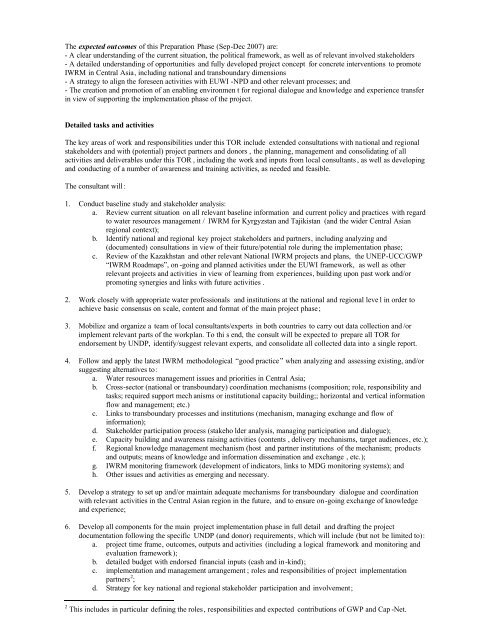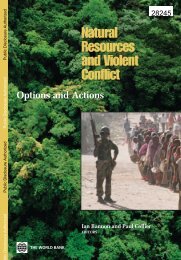Terms of Reference (International Consultancy) For ... - WaterWiki.net
Terms of Reference (International Consultancy) For ... - WaterWiki.net
Terms of Reference (International Consultancy) For ... - WaterWiki.net
You also want an ePaper? Increase the reach of your titles
YUMPU automatically turns print PDFs into web optimized ePapers that Google loves.
The expected outcomes <strong>of</strong> this Preparation Phase (Sep-Dec 2007) are:<br />
- A clear understanding <strong>of</strong> the current situation, the political framework, as well as <strong>of</strong> relevant involved stakeholders<br />
- A detailed understanding <strong>of</strong> opportunities and fully developed project concept for concrete interventions to promote<br />
IWRM in Central Asia, including national and transboundary dimensions<br />
- A strategy to align the foreseen activities with EUWI -NPD and other relevant processes; and<br />
- The creation and promotion <strong>of</strong> an enabling environmen t for regional dialogue and knowledge and experience transfer<br />
in view <strong>of</strong> supporting the implementation phase <strong>of</strong> the project.<br />
Detailed tasks and activities<br />
The key areas <strong>of</strong> work and responsibilities under this TOR include extended consultations with national and regional<br />
stakeholders and with (potential) project partners and donors , the planning, management and consolidating <strong>of</strong> all<br />
activities and deliverables under this TOR , including the work and inputs from local consultants , as well as developing<br />
and conducting <strong>of</strong> a number <strong>of</strong> awareness and training activities, as needed and feasible.<br />
The consultant will :<br />
1. Conduct baseline study and stakeholder analysis:<br />
a. Review current situation on all relevant baseline information and current policy and practices with regard<br />
to water resources management / IWRM for Kyrgyzstan and Tajikistan (and the wider Central Asian<br />
regional context);<br />
b. Identify national and regional key project stakeholders and partners, including analyzing and<br />
(documented) consultations in view <strong>of</strong> their future/potential role during the implementation phase;<br />
c. Review <strong>of</strong> the Kazakhstan and other relevant National IWRM projects and plans, the UNEP-UCC/GWP<br />
“IWRM Roadmaps”, on -going and planned activities under the EUWI framework, as well as other<br />
relevant projects and activities in view <strong>of</strong> learning from experiences, building upon past work and/or<br />
promoting synergies and links with future activities .<br />
2. Work closely with appropriate water pr<strong>of</strong>essionals and institutions at the national and regional leve l in order to<br />
achieve basic consensus on scale, content and format <strong>of</strong> the main project phase;<br />
3. Mobilize and organize a team <strong>of</strong> local consultants/experts in both countries to carry out data collection and /or<br />
implement relevant parts <strong>of</strong> the workplan. To thi s end, the consult will be expected to prepare all TOR for<br />
endorsement by UNDP, identify/suggest relevant experts, and consolidate all collected data into a single report.<br />
4. Follow and apply the latest IWRM methodological “good practice” when analyzing and assessing existing, and/or<br />
suggesting alternatives to:<br />
a. Water resources management issues and priorities in Central Asia;<br />
b. Cross-sector (national or transboundary) coordination mechanisms (composition; role, responsibility and<br />
tasks; required support mech anisms or institutional capacity building;; horizontal and vertical information<br />
flow and management; etc.)<br />
c. Links to transboundary processes and institutions (mechanism, managing exchange and flow <strong>of</strong><br />
information);<br />
d. Stakeholder participation process (stakeho lder analysis, managing participation and dialogue);<br />
e. Capacity building and awareness raising activities (contents , delivery mechanisms, target audiences, etc.);<br />
f. Regional knowledge management mechanism (host and partner institutions <strong>of</strong> the mechanism; products<br />
and outputs; means <strong>of</strong> knowledge and information dissemination and exchange , etc.);<br />
g. IWRM monitoring framework (development <strong>of</strong> indicators, links to MDG monitoring systems); and<br />
h. Other issues and activities as emerging and necessary.<br />
5. Develop a strategy to set up and/or maintain adequate mechanisms for transboundary dialogue and coordination<br />
with relevant activities in the Central Asian region in the future, and to ensure on-going exchange <strong>of</strong> knowledge<br />
and experience;<br />
6. Develop all components for the main project implementation phase in full detail and drafting the project<br />
documentation following the specific UNDP (and donor) requirements, which will include (but not be limited to):<br />
a. project time frame, outcomes, outputs and activities (including a logical framework and monitoring and<br />
evaluation framework);<br />
b. detailed budget with endorsed financial inputs (cash and in-kind);<br />
c. implementation and management arrangement ; roles and responsibilities <strong>of</strong> project implementation<br />
partners 2 ;<br />
d. Strategy for key national and regional stakeholder participation and involvement;<br />
2 This includes in particular defining the roles, responsibilities and expected contributions <strong>of</strong> GWP and Cap -Net.













